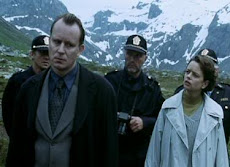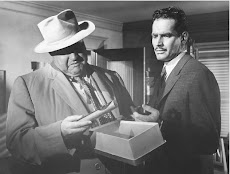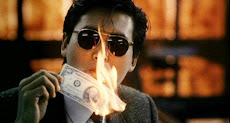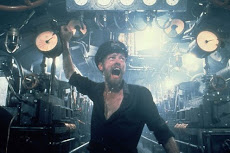HBO begins a new miniseries this weekend, The Pacific. It's the first much-anticipated mini in America since, well, Band of Brothers. Once a decade, eh?
Considering that American critics often scoff at films with running times over three hours even in instances when such length is warranted, perhaps most non-HBO miniseries are doomed on arrival in the United States. On the other hand, the advent of TV-on-DVD and TiVo has led to plenty of weekend marathons: I know I'm not the only one who can plow through a 13-episode season of Mad Men or The Shield in two or three days (some prefer doing it one sitting). Given this not-too-uncommon approach, I think it's fair to give the miniseries a good plug. Long a staple in England and elsewhere, it's only in rare instances that a mini is produced in America or by Americans. As basic cable networks move more and more into original programming (e.g., both series I just mentioned), shorter seasons are required to ensure the right per-episode budget. Why not aim for more one-shot style programming?
Many minis come from novels, and a quick comparison shows that given the right amount of running time a novel can be adapted far more faithfully (i.e., better) than in a feature film. Jane Austen provides good examples: though the 127-minute Pride and Prejudice (2005) is quite good, it does not live up to the BBC's 300-minute mini of the same title (1995). Even Sense and Sensibility (1995), a bona fide Hollywood masterpiece, cedes ground to a more recent mini (2008). By way of introduction to my fellow American viewers, I offer three of my personal favorite minis:
Brideshead Revisited (1981)

Recently victimized by an awful Hollywood adaptation, Evelyn Waugh's novel of friendship, Catholicism, and the decay of the British aristocracy following World War I also enjoys the privilege (even 30 years later) of being standard-bearer for all other minis. "Spared no expense" does not always produce art (e.g., this, and, oh yeah, this), but for Brideshead it was essential. The dialogue and narration is taken almost verbatim from the novel and supplemented with cinematography that would better suit the big screen (especially considering the average size of televisions in 1981). Though only Jeremy Irons enjoys prominence in America today, the series also launched Anthony Andrews, who's continued to own almost every part since (my previous lazy post features a clip from Under the Volcano, a film that benefits from a small but integral supporting role by Andrews).
The story of Brideshead is a sort of bell curve that traces Charles Ryder's (Irons's) life from college through middle age and his experience with the Flytes, a very Catholic, very wealthy and very troubled family. It begins with a deep friendship between Charles and the youngest male Flyte, Sebastian (Andrews), but then transitions into Ryder's adulterous love for Sebastian's sister Julia. A descent from skeptical agnosticism to full-blown atheism parallels this. An otherwise self-indulgent lifestyle leaves one quite angry and unsympathetic to Charles.
The bell curve slowly inches down into despair, but it suddenly swoops up, prompted by the sudden re-appearance of God, Whom Charles made every (seemingly successful) effort to banish. This is shocking, even devastating, and one of the most realistic, faithful portrayals of Christianity put onto film. I suspect those with faith will recognize God's victory with relief, perhaps even relish, and only hope those who empathize with Charles's efforts to destroy God learn more of Christianity from their viewing experience rather than take it as mortar to keep building walls.
Band of Brothers (2001)
 The jury is still out on The Pacific, but it has a lot to live up to. Even though Band of Brothers is one of the few American-financed minis, it was produced entirely in England. The work is adapted from a book by Stephen Ambrose of the same title, and it is very well-regarded (or at least heard of) by many TV-watching Americans.
The jury is still out on The Pacific, but it has a lot to live up to. Even though Band of Brothers is one of the few American-financed minis, it was produced entirely in England. The work is adapted from a book by Stephen Ambrose of the same title, and it is very well-regarded (or at least heard of) by many TV-watching Americans.The series follows the exploits of Easy Company of the 101st Airborne Division in World War II, from basic training through D-Day and all the way to the end of the war. Within this narrative are various stories of individuals, with most respective episodes focusing on different members of the company. Since this is such a popular series, and because its popularity will only spike again in light of The Pacific, there is not too much to add but my own recommendation. If you haven't watched Band of Brothers, do so.
The Last Place on Earth (1985)

In 1911, just prior to World War I, there were still parts of Earth unseen by man. One place was the South Pole. Roald Amundsen of Norway and Robert Scott of Great Britain both had their sights on this pole. Their respective attempts were nominally scientific expeditions, but there was no hiding the potential prestige that would come to the explorer who first conquered the Antarctic (not to mention his country). It was a race.
Like Brideshead, Last Place on Earth is perfected visual craftsmanship. Perhaps it's silly to say, but one can almost feel how cold it is in Antarctica just by watching. The acting, from lead roles by Martin Shaw (Scott) and Sverre Ousdal (Amundsen) down to a small supporting part by Hugh Grant (his second acting job) is excellent. And the story never lets up. Unlike the admittedly slow (though that's not to say boring) pace of Jane Austen minis, even the less dramatic parts of the narrative convey tension, perhaps even dread: Antarctica is not a place to visit, but a force to be reckoned with.
Last Place on Earth pulls no punches against Scott and what I can only classify as his distinct pre-WWI British arrogance. Some reviewers have called some of this criticism unfair. Nevertheless, it is fascinating to see the difference between the explorers and their expeditions. Both take to the race with vigor, but only Amundsen appreciates the danger. The expeditions each face setbacks and danger, but where the Norwegians conquer the British blunder. Perhaps there is no better film that juxtaposes a narrative of victory and one of tragedy so well.
Each of these minis are 5/5 stars, and well-worth owning for repeated viewings.
As I mentioned earlier, the miniseries is unfortunately under-utilized. I recently watched the made-for-TV Pirates of Silicon Valley and think it had all the makings of a miniseries, but was instead crammed into about 90 minutes. Even then, some stories that are made into minis (like ESPN's The Bronx is Burning) are so crammed with commercials they hardly ever get around to telling a coherent story (though, for sports fans, perhaps quick-burst clips are the way to go). Nevertheless, there are a number of great miniseries out there, and they live up to some of the best films.


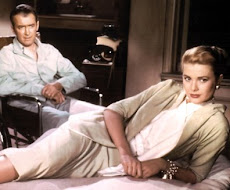_01.jpg)






